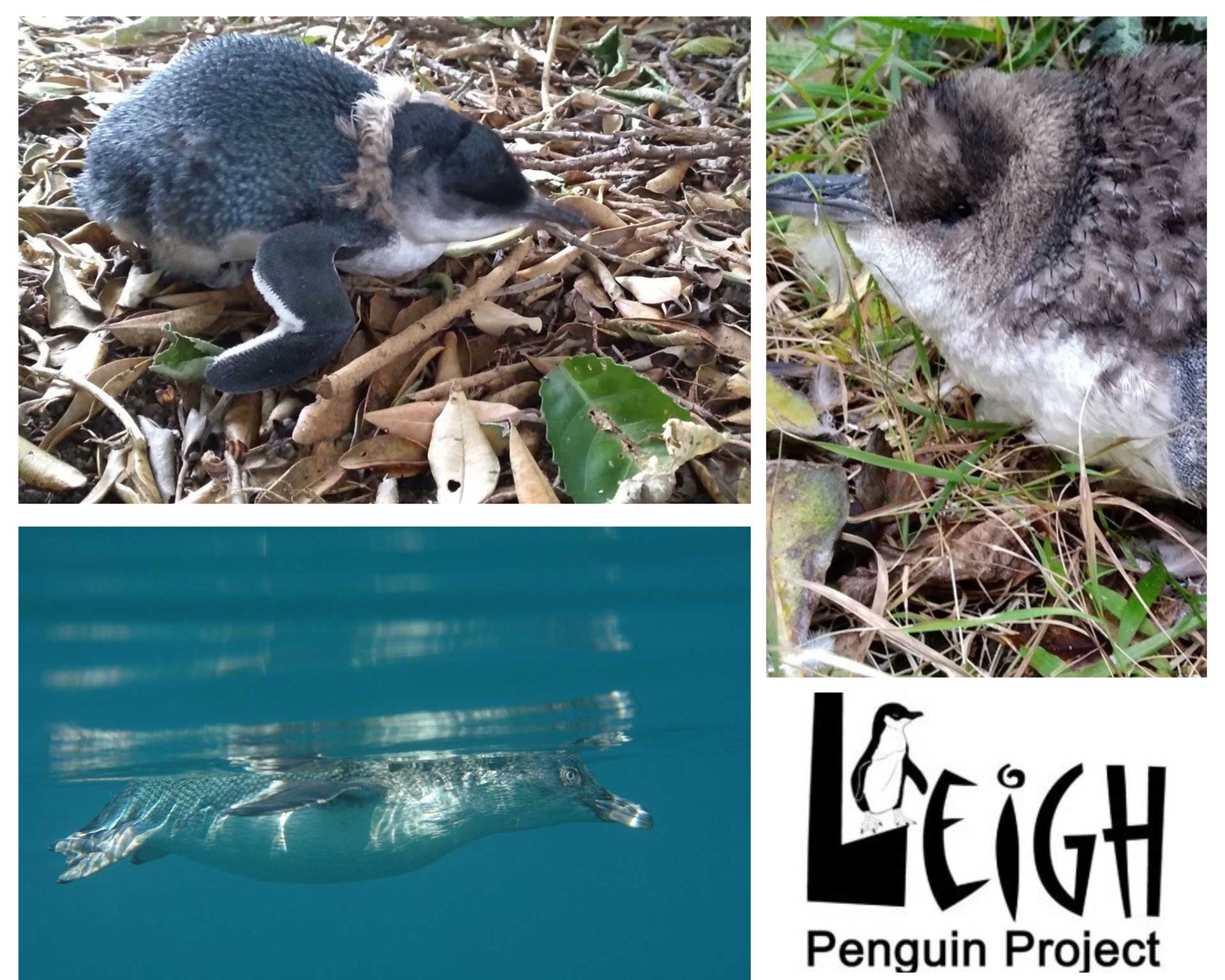
Leigh Penguin Project– Nesting season Sept – February
The Forest Bridges Trust’s Ecology and Biodiversity advisor Dr Virginia Moreno recently discovered that she had a kororā / little blue penguin nesting near her house.

Thanks to the trapping efforts and number of nesting boxes made and placed by members of the Leigh Penguin Project and Warkworth Area Forest & Bird kororā can still be spotted between Ti Point and Goat Island.
With the kororā nesting season typically taking place from September to February in New Zealand we thought that now was a good time to catch up with Tony & Jenny Enderby from The Leigh Penguin Project to find out more about the kororā and what we should all be mindful of during the breeding and nesting months.
“Kororā or little blue penguins are also called little penguins, blue penguins and fairy penguins” explained Tony Enderby from the Leigh Penguin Project. “They have a distinctive bluish-grey plumage, a height of about 25 to 30 centimetres and a weight of around 1 kilogram, making them the world’s smallest penguin”.
The Leigh Penguin Project covers the area between Goat Island Marine Reserve and Ti Point Wharf. Over the 2022-23 breeding season, they recorded 40 nesting sites. Most of these were natural sites in caves and holes under trees but kororā were also found in nesting boxes which had been placed around the coast.
“Kororā generally spend the hours of darkness on land and daylight hours at sea, feeding. Our cameras usually pick them up leaving an hour before daylight and around dusk back ashore. They are rarely seen on land during daylight apart from moulting and this is when they are vulnerable and can be at risk from dogs” says Tony.
“Kororā begin to come ashore in May then go back to sea and feed then return in June and July and begin nesting. We see them on camera carrying nesting material such as twigs, leaves etc into nesting sites. There are a few fights as they pair up and mating occurs regularly. Kororā are usually monogamous but will seek a new partner if one bird dies. Both parents sit on the eggs (usually two), taking turns to sit and go to sea to feed. If the feeding bird fails to return the other bird will remain for some time before abandoning the nest. They breed from 2-3 years of age and nesting is between August and November. The chicks hatch between 30 and 40 days. The chicks usually fledged seven weeks after hatching. We have noted from our trail cameras that the parents just stop returning, and the chicks are left to fend for themselves. Again, they are very vulnerable to dogs at this point as they head for the sea and begin feeding. Unfortunately, kororā populations are decreasing, and some have vanished”.
The little blue penguin, or kororā, faces several threats that can impact their populations and habitats including habitat destruction through coastal development, fishing nets and pollution affecting food sources, but by far the biggest threat to kororā comes from predation. Dogs are likely the greatest threat to little blue penguins, although cats, ferrets and stoats will also kill them.
“Dogs are a huge problem” explains Tony, “despite most people keeping dogs on a leash. More protection of the Hauraki Gulf would help. We just hope that our local penguin populations can be saved, our team are working hard to try and make this happen”.

Another area of concern for Tony and the team has been the recent floods and weather conditions in Auckland. “The heavy rain between July 2022 and June 2023 had a huge impact with nesting boxes and traps being washed away and many natural nesting sites inundated. The number of birds recorded could be as low as 50% of last year. We have heard from other penguin groups that nesting seems to be later this year so it will be a while before we have a real picture of numbers”.
The Leigh Penguin Project with the help of volunteers, a supportive community and Warkworth Forest & Bird has focused its efforts on addressing the threats faced by the kororā by implementing measures such as predator control, habitat restoration, public education and awareness campaigns, and nesting site management.
“The Leigh Penguin Project was formed in 2018 as part of the Warkworth Forest and Bird organisation” explained Tony” The first nesting boxes were built by F&B members and traps were supplied by Leigh local through donations. Rodney Local Board also supplied traps, a DOC grant and an Auckland Council grant to continue the efforts of the more than 40 volunteers involved in the project. More than 250 traps are monitored by our volunteers around the nesting sites. Donations of timber from Matakana ITM, and donations from Penguin Books and many local people help the project continue.
If you live locally and would like to help with predator controls or penguin monitoring, please contact the The Leigh Penguin Project / Kororā Project. They are also interested in any sightings of little blue penguins coming ashore around the local coast. Please email leighpenguins@gmail.com or check out the Leigh Penguin Project Facebook page.
How to help keep penguins safe:
- Leave penguins alone. Usually, scruffy birds are simply moulting.
- Put your dog on a leash around penguin areas.
- Keep your dog away from nests and warn others nearby of the location.
- Donate your time or money to help penguin protection groups, such as The Leigh Penguin Project, Yellow-eyed Penguin Trust and Forest & Bird.
Please see the DOC website for more information and find out what you can do if you encounter an injured penguin.
